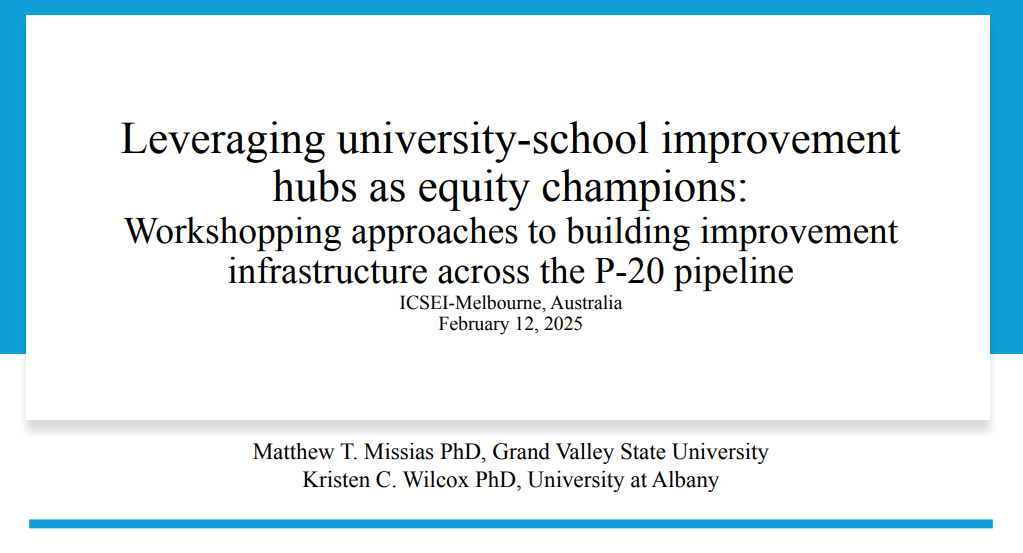International Perspectives on School Improvement and Effectiveness
by, Kristen C. Wilcox
The International Congress for School Improvement and Effectiveness (ICSEI) is a venue for those committed to the ICSEI three-decade old mission “to empower school effectiveness and improvement” by providing opportunities such as the Congress for networking improvers and scholars committed to school improvement.
This year the University of Melbourne is hosting the event, and I am delighted to partner with colleague Matt Missias, a School Support Specialist and adjunct faculty member from Grand Valley State University, to share our experiences and a few favorite approaches we use in developing partnerships with our P-12 colleagues.
Importance of university-school improvement hubs
Higher education (HE) faculty face challenges in creating and sustaining opportunities to collaborate with P-12 school peers. Improvement research in education (IRE) scholars have called for integrating “practice-focused, practice-grounded continuous improvement (CI) into the broader K-12 public education enterprise” as one promising approach to address equity challenges.
IRE has suggested that for school improvement to take hold and be sustained over time, participatory engagement of stakeholders and garnering diverse perspectives is key. When P-12 educators and university faculty and resources come together, the possibility of achieving high-quality, equitable lifelong education opportunities for all students, especially those who experience barriers to HE, increases.
 To do this, university-school improvement hub leaders must interrogate the power relations across P-12-HE systems and draw on collective expertise. Our workshop establishes the relevance of the topic in the IRE literature and facilitators’ own practice. Two approaches we explore in the workshop are:
To do this, university-school improvement hub leaders must interrogate the power relations across P-12-HE systems and draw on collective expertise. Our workshop establishes the relevance of the topic in the IRE literature and facilitators’ own practice. Two approaches we explore in the workshop are:
- Using empathy mapping to identify an equity-centered problem of practice on which to focus school improvement efforts.
- Using ecosystem mapping to identify the interconnections between all the people, organizations, ideas, and other factors that impact how and what is done to address problems of practice.
Key take-aways on school improvement from an international perspective
While our workshop responds to the 2025 call for “practical innovation in the context of school effectiveness and improvement in education” and particularly with regard to issues of diversity and inclusivity upon which educational systems in democratic societies rely, the keynote by Professor and Dean of the Faculty of Education Dr. Jim Watterston emphasized several important points for reflection:
Dr. Watterston focused attention on four key questions:
- What is today’s core purpose of a school?
- How do you ensure that every student is confident, capable, creative, flexible, and successful?
- Where do teachers need to invest their energy to make a difference?
- Is good teaching enough?
One sobering issue and in relation to PISA results, Dr. Watterston reported, “In most countries/economies, students attending schools whose principal reported shortages of teaching staff scored lower results…”. We, at NYKids, have also found this correlation and have investigated the contributing factors to teacher shortages in our most recent study. In the keynote several issues were raised – including the “crowded curriculum” and this being just one of the challenges teachers face. Dr. Watterston wrapped up his talk to discuss the “Sisyphus trap” – of teachers doing more and more and that not getting them ahead. One place he advocated to look for shift – is “inverting the triangle.”

In this “inverted” world – student agency and teachers would be centered in navigating a course forward and with school leaders, regional leaders, and systems leaders supporting their work. Second, Dr. Watterston advocated for a “whole of government approach” – this spanning health and family services, transportation, arts, police, etc. – so that facing the challenges of youth is tackled through coordinated efforts.
To read more on this topic, check out the full presentation here and keep up with our latest blog posts. We welcome your questions or feedback at nykids@albany.edu. Please follow us on Facebook, X, Instagram, and LinkedIn.
